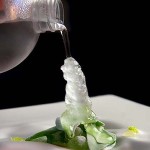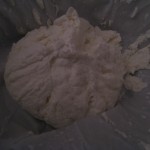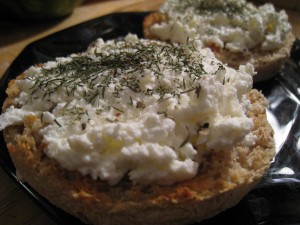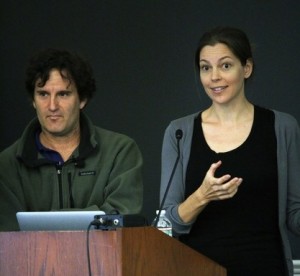One day, while I was procrastinating from doing homework for my online Science and Cooking class and a million other tasks by poking around on Arts & Letters Daily, I came across this article from the London Review of Books. Apparently, I am not the only person who was lured into taking a Harvard science class by the insertion of “cooking” into the title. Just remember, readers, where you heard it first.
 When I did finally stop surfing the web and started doing my online coursework, I noted dismally that I am falling pretty far behind. I have waded through material on phase changes, but I still confuse elasticity and plasticity, and who knows when I’ll finally get around to spherification. I think the main problem is that I get weirdly hypnotized by certain videos and have to stop working to let them sink into my brain. For instance, who would have guessed that very, very pure water doesn’t freeze easily, even in a refrigerator that is kept below the freezing point, because there are no microscopic bits of muck for the ice crystals to glom onto? It’s called supercooling (no, I am not making that word up), and it allows for wacky poured ice sculptures to be created at the table by fancy chefs like Jordi Roca. (Note: the instant formation of it is more magical and less phallic than this still image would have you believe.) Seriously, don’t you feel like you need a few minutes to digest that image before you memorize some formulas? I did.
When I did finally stop surfing the web and started doing my online coursework, I noted dismally that I am falling pretty far behind. I have waded through material on phase changes, but I still confuse elasticity and plasticity, and who knows when I’ll finally get around to spherification. I think the main problem is that I get weirdly hypnotized by certain videos and have to stop working to let them sink into my brain. For instance, who would have guessed that very, very pure water doesn’t freeze easily, even in a refrigerator that is kept below the freezing point, because there are no microscopic bits of muck for the ice crystals to glom onto? It’s called supercooling (no, I am not making that word up), and it allows for wacky poured ice sculptures to be created at the table by fancy chefs like Jordi Roca. (Note: the instant formation of it is more magical and less phallic than this still image would have you believe.) Seriously, don’t you feel like you need a few minutes to digest that image before you memorize some formulas? I did.
 Another problem is that I’m lagging behind on my labs. The use of my disorderly, cluttered kitchen as a laboratory makes me nervous and leaves me with little hope of precision. But when I can rouse myself to action, they usually prove interesting. By far the best lab so far has been making ricotta cheese from a quart of milk and a little white vinegar. I’m actually not sure what I was supposed to learn about phase changes from this, but I made cheese, guys! From scratch. Continue reading
Another problem is that I’m lagging behind on my labs. The use of my disorderly, cluttered kitchen as a laboratory makes me nervous and leaves me with little hope of precision. But when I can rouse myself to action, they usually prove interesting. By far the best lab so far has been making ricotta cheese from a quart of milk and a little white vinegar. I’m actually not sure what I was supposed to learn about phase changes from this, but I made cheese, guys! From scratch. Continue reading


